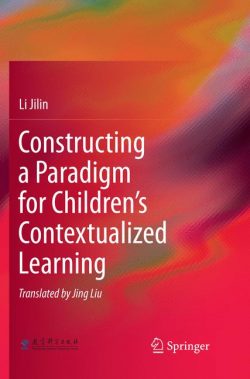The first book in the series Policy and Pedagogy with Under-three year olds: Cross Disciplinary insights and innovations establishes a path for the much-needed examination of the experiences of infants and toddlers in contemporary educational settings across the globe. Bringing together internationally renowned scholars in the field, it starts a series of discussions about the positioning of under-three year olds in contemporary practice and policy contexts. It takes an in-depth look at what this means for our understanding of under-three year olds and those who share their worlds. Featuring some of the most important contemporary topics in this pedagogical domain, such as care, well-being, belonging, professionalism and status, the contributors offer a kaleidoscope of perspectives for contemplating the new normality of very young children living their lives in group-based early childhood settings, and what gives rise to their current realities. It also explores some important policy directions and trends.
Chapter 1 Introduction: Pedagogy and policy for birth-to-three year-olds.- Part One: Foregrounding Pedagogy.- Chapter 2 Intersubjectivity in the Imagination and Feelings of the Infant: Implications for education in the early years.- Chapter 3 A ‘good life’ for infants in early childhood education and care? The place of well-being in ECEC curriculum, pedagogy and policy.- Chapter 4 Care, upbringing and teaching in ‘horizontal’ transitions in toddler day-care groups.- Chapter 5 Toddlers’ participation in joint activities with peers in nido.- Chapter 6 The richness of everyday moments: Bringing visibility to the qualities of care within pedagogical spaces.- Chapter 7 Supporting concordant intersubjectivity and sense of ‘belonging’ for under three-year-olds in early years settings.- Part Two: Foregrounding policy.- Chapter 8 Tensions and challenges in Professional Practice with Under-threes: A New Zealand reflection on Early Childhood Professionalism as a systemic phenomenon.- Chapter 9 Educators’ perspectives on attachment and professional love in early years settings in England.- Chpater 10 Babyroom workers: Care in practice.- Chapter 11 Influences on US higher education programs educating the Infant-Toddler Workforce.- Chapter 12 Family day care: The trilemma of professionalization, sustainability and fairness in Flanders, France and Germany.- Chapter 13 A quality framework for early childhood practices in services for children under three years of age: Starting regionally – moving globally.- Chapter 14 Provision for ‘under 3’s’ in Australian early childhood education and care policy commitments: A metaphorical canary in the coal mine?.
E. Jayne White has a long-standing interest in education, with particular emphasis on early years pedagogy, spanning over thirty years as a teacher and researcher. As Associate Director for the WMIER Visual Lab and Centre for Global Studies at the University of Waikato, NZ, Jayne’s work focuses on the complex processes and practices of meaning-making – with an emphasis in the earliest years. She has written extensively in the field, including her recent sole-authored book Introducing dialogic pedagogy: Provocations for the early years with Routledge and the Springer publication with Eva Johansson titled Educational research with our youngest: Voices of infants and toddlers (2011) which first proposed an infant research agenda. She is co-editor of Springer’s recently launched Video Journal of Education, associate editor of the International Journal of Early Childhood and edits for a number of additional international journals.
Carmen Dalli is Professor of Early Childhood Education, Director of the Institute for Early Childhood Studies, and Associate Dean (Research) at Victoria University of Wellington’s Faculty of Education. Her research combines an interest in developmental issues in the early years with a focus on early childhood policy and pedagogy. She has published widely in the field of early childhood teacher professionalism and has a particular interest in group-based early childhood education and care settings for children aged under three years. She regularly publishes commentaries on early childhood education policy in New Zealand.
The first book in the series Policy and Pedagogy with Under-three year olds: Cross Disciplinary insights and innovations establishes a path for the much-needed examination of the experiences of infants and toddlers in contemporary educational settings across the globe. Bringing together internationally renowned scholars in the field, it starts a series of discussions about the positioning of under-three year olds in contemporary practice and policy contexts. It takes an in-depth look at what this means for our understanding of under-three year olds and those who share their worlds. Featuring some of the most important contemporary topics in this pedagogical domain, such as care, well-being, belonging, professionalism and status, the contributors offer a kaleidoscope of perspectives for contemplating the new normality of very young children living their lives in group-based early childhood settings, and what gives rise to their current realities. It also explores some important policy directions and trends.





